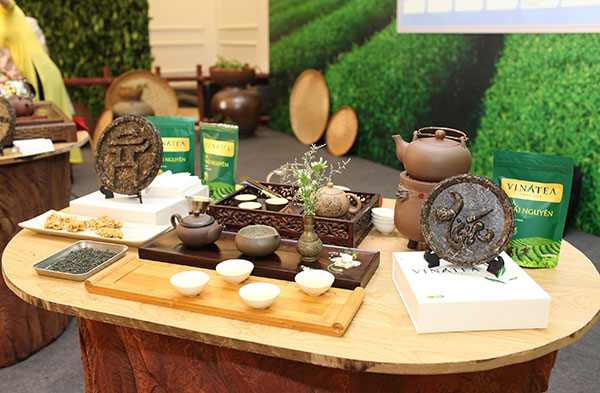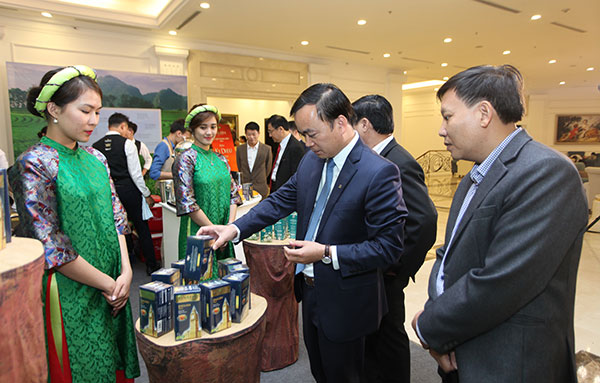Vinatea turns back to domestic market
 |
Vinatea will increase its focus on the domestic market, which promises stronger growth and harbours yet unexploited potential. The firm marked its return by introducing 10 new brands at an event titled "A miraculous gift of nature” in Hanoi last week.
The new products include Hundred Year White, Japan Sencha, a premium range of Oolong teas, Thai Nguyen green, British and Jasmine teas for the affordable range such as Ginger and Honey Daisy. This collection of tea blends is carefully selected and monitored under strict processes.
Lai Cao Le, chairman of the board at Vinatea, said that tea drinking has been a tradition of Vietnamese people for over a thousand years. However, Vietnamese tea manufacturers have failed to build a trademark in the domestic market dominated by international brands.
 |
The Vietnamese tea market offers a significant opportunity for tea manufacturers. Many foreign tea brands are increasingly expanding sales operations, while domestic tea manufacturers manage to attract tea lovers, especially young consumers.
A new market research found that black tea consumption, in addition to the traditional green tea, is becoming more common among office workers in big cities due to strong marketing by branded tea manufacturers. Especially younger generations, who used to count as the thinnest layer of consumers, are now changing habits, thereby stimulating strong growth in the sales of fruit, milk, and bubble teas.
Luxury tea boutiques have become commonplace in many shopping malls across Hanoi and Ho Chi Minh City. Milk tea shops and franchise chains are highly prevalent due to the rising tea consumption. Thus, Vinatea introduced this new collection focusing on green tea lovers, office workers, and younger consumers.
According to Le, Vinatea has become a private company in September last year after GTN Foods acquired 95 per cent of its holdings. The equitisation has driven Vinatea to leverage itself to a new level. The firm has introduced a new brand identity since November, aiming to secure a foothold in the north before expanding operations nationwide.
In addition to domestic expansion, he added that Vinatea continues its efforts to boost its export capacity and build a Vietnamese tea trademark in the global market. The firm has upgraded its tea plantations to raise the quality and value of exports.
“Vietnamese tea is greatly undervalued and ranks on the lower end of the global tea market, despite the high export volume. To increase the value of Vietnamese tea, it is critical to improve quality, meet hygiene standards, and safety requirements of the global tea sector,” he said.
Founded in 1958, Vinatea boasts the largest tea material resources in Vietnam with over 4700 hectares of tea plantations and 11 facilities in Hanoi, Moc Chau, Phu Da, and Nghia Lo provinces. The firm is developing clean tea plantation areas meeting global standards. Besides using the latest European technology to process green and black tea, Vinatea has also joined hands with Vietnamese tea masters to make their products more unique.
What the stars mean:
★ Poor ★ ★ Promising ★★★ Good ★★★★ Very good ★★★★★ Exceptional
Latest News
More News
- State corporations poised to drive 2026 growth (February 03, 2026 | 13:58)
- Why high-tech talent will define Vietnam’s growth (February 02, 2026 | 10:47)
- FMCG resilience amid varying storms (February 02, 2026 | 10:00)
- Customs reforms strengthen business confidence, support trade growth (February 01, 2026 | 08:20)
- Vietnam and US to launch sixth trade negotiation round (January 30, 2026 | 15:19)
- Digital publishing emerges as key growth driver in Vietnam (January 30, 2026 | 10:59)
- EVN signs key contract for Tri An hydropower expansion (January 30, 2026 | 10:57)
- Vietnam to lead trade growth in ASEAN (January 29, 2026 | 15:08)
- Carlsberg Vietnam delivers Lunar New Year support in central region (January 28, 2026 | 17:19)
- TikTok penalised $35,000 in Vietnam for consumer protection violations (January 28, 2026 | 17:15)
















 Mobile Version
Mobile Version